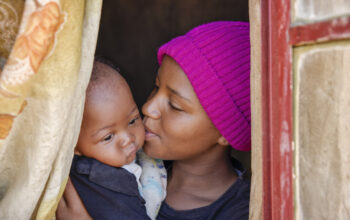Ushering in a new era for cancer therapy
Almost 40% of people will be diagnosed with cancer during their lifetime. In 2020, cancer accounted for about 10 million deaths globally. That means almost one in six deaths was due to cancer.
For many of us, cancer is very close. It could be a loved one or even ourselves. The impact of cancer is never far away. But we are determined to take the fight to the disease through compassion, care, and innovation in medicines as part of a holistic healthcare approach.
Survival rates for cancer are improving, especially in countries with advanced health systems. Globally, though, the cancer burden continues to grow. From over 18 million cancer cases in 2018, we can expect 29 million cancer cases by 2040 due to demographic growth and ageing populations.
Cancer is the second leading cause of death globally
Of the 10 million annual cancer deaths globally, 70% occur in low and middle-income countries (LMICs) where the cancer mortality rate is projected to increase to 16.3 million by 2040.
The COVID-19 pandemic had a very negative effect on cancer screening, diagnosis and treatment. In the early days of the pandemic, the diagnosis of invasive tumours fell by 44% in Belgium while, in Italy, colorectal screenings dropped by 46% between 2019 and 2020. In Spain, the number of cancers diagnosed in 2020 was 34% lower than expected. The resilience of healthcare systems to handle cancer, in particular, is an important part of pandemic preparedness.
Innovation is making a difference
Breakthroughs in science are revolutionizing cancer care. Survival rates are improving and we are making gains in quality of life.
The fight against cancer never ends. Scientists are always searching for new innovations. Cancer is the disease area that has the most treatments in the pipeline, with thousands of clinical trials for cancer therapies supported by the biopharmaceutical industry.
In the past, scientists focused on the five big cancers: breast, lung, prostate, bowel, and skin. But we know that cancer is really 200 different diseases. So what we think of as lung cancer, for example, is actually a group of different subtypes, each with its own challenges.
We now know that cancer isn’t a single disease. It has over 200 different subtypes.
This discovery, along with a greater understanding of how cancer starts, progresses, and works at a cellular level, has led us to re-imagine cancer care beyond prevention. Innovation in areas like immuno-oncology, cell and gene therapy, RNA therapy, and precision oncology offer the potential to attack cancer from every angle with the goal of transforming patients’ lives. Scientists are using data science, advanced clinical trial solutions, and robust digital technologies like artificial intelligence to accelerate the medicines development process. Precision oncology, tailored to specific patient needs, is radically changing prognoses and outcomes.
Through translational medicine, scientists are deepening their understanding of disease biology and uncovering novel biomarkers to help predict how cancer patients will respond to treatment.
Delivering innovative new medicines to patients
As the level of precision and tailoring in these new treatments rises, so does the complexity and challenge of diagnosing cancer and approving, producing, and administering treatments so that they reach the right patient at the right time.
Some new treatments are biotherapeutics, created from harnessing and modifying living cells. As an example, to treat a specific tumour, a sample must be taken from the patient, profiled and then manufactured, effectively tailoring a treatment unique to that patient. This presents both technical and regulatory challenges. It is no longer about approving a one-size-fits-all medicine for a whole population.
These advances in cancer care reveal that innovative new treatments aren’t enough. Performance in cancer care is unequal, depending on local circumstances and making the most of available resources to achieve the best outcomes for patients and society is critical. Healthcare systems will need to continue to adapt as clinicians build the expertise in these new treatments. Supporting patients throughout their treatment, listening to them, answering their questions, managing side-effects, and assessing the services they need must be at the heart of this evolution.
Partnerships are valuable in helping to overcome systemic challenges for patients’ access to innovation.
Healthcare system performance and cancer control remain unnecessary variables. Through initiatives like All.Can, where BMS is a founding member and lead partner, multiple stakeholders are striving to improve efficiency in cancer care. BMS is working in partnerships from across the cancer community to improve patient outcomes by innovating more efficient and effective cancer care from screening, early detection, and diagnosis through to improving patient support and navigation and optimizing care management.
BMS partners with C/Can, an initiative that supports cities globally to improve access to quality and equitable cancer care. C/Can brings together stakeholders from the public and private sectors to design, plan, and implement cancer solutions. In May, the World Health Organization (WHO) launched the implementation of its Global Breast Cancer Initiative aimed at reducing breast cancer mortality worldwide by 2.5% annually. That would mean saving 2.5 million lives over 20 years. The WHO is partnering with City Cancer Challenge, part of C/Can, to implement the initiative, with BMS as a core partner through knowledge sharing and funding. IFPMA has played a catalyst role in this public-private collaboration, which counts four industry participants.
All patients should have access to transformational medicines, regardless of where they live. Working with a diverse network of partners, BMS’ global programs help to strengthen health systems’ capacity and improve access to treatments. We pursue diversity in clinical trials, knowing that, among other characteristics, age, race, and ethnic background can sometimes determine how a potential treatment works in a patient.
We train healthcare professionals in good clinical practices through national and regional hubs and we support education and disease awareness initiatives for patient and community groups. Through the Access Accelerated Initiative, BMS, along with industry partners, are tackling inequities in non-communicable disease care in LMICs. As well as funding, we help to mobilize the technical expertise of on-the-ground partners to design and implement solutions for supply chain, primary care, and digital health needs.
It is important to keep innovating across all areas of a medicine’s lifecycle and throughout health systems so that, together, we move closer to earlier diagnosis, more effective treatment, and better outcomes for cancer patients, no matter where they live.
Author






